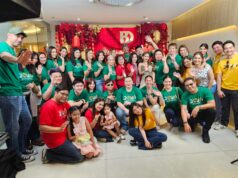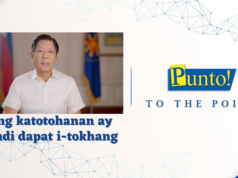THE RECENT May 13 elections saw the country submerged, not by rain as it was one of the hottest summers ever, in political muck. It was a season of mudslinging, vilification, manufacture and spread of fake news, vicious trolling and other usual shenanigans that characterize our elections.
Candidates old and new from both sides of the political spectrum were at it, pulling each other deeper into the quagmire.
But by July 1, all this should come to an end (or will it?), as the victorious shall have started office. It should be the beginning of actually putting to reality the promises they made to the people.
For some of them, July 1 shall be the first day of their political careers. But for most, the day will just be the opening page of another chapter of the sad history of our politics, the narrative of patronage politics.
It does not need a census to reveal that the majority of those who won are old familiar names. The old familiar names of families who ruled over us as far as we can recall. In fact, most of the greenhorns are having the same names, being scions or direct kin of politicians who have been lords of their fiefdoms for generations, whose forebears were likewise as such.
We need not look beyond Angeles City. Those who will rule starting July 1 have surnames which are all too familiar, as their fathers and grandfathers have ruled our fathers and grandfathers before.
In fact, it was as early as a generation ago too that I, while teaching in the academe, wrote a paper on this. I retrieved and read again the paper a few days ago, and it was as if I only wrote it a few moments ago, as it seems nothing changed, including the names of the characters of the story I tried to tell two decades ago.
Adding a few insights and present-day details, may I retell my take of the realities of our politics and electoral practice, even if there is no substantial difference of what was then to what is now.
Election Perspectives
My three term engagement in local politics gave me first hand information and deeper understanding of the dynamics of Philippine politics far greater than the lessons I had during my years of studies in Public Administration at the University of the Philippines. As direct participant in the local political arena, I was able to observe and note of the varied attitudes and appreciation of people towards politics, elections and governance.
My being out of politics since the late 1980s also gave me a broader perspective and bigger vantage point, further validating many of my observations when I was into local politics.
One glaring example is the observation that elections are viewed by a great number of voters as a seasonal event that usually ends after one has written on his or her ballot, and rarely as a commencement of something more important – governance.
Continuity or what happens after the elections seems farthest from the concerns of the majority of voters.
The fleeting interest of the people in the process of selecting their leaders has allowed the triumph of politicians and candidates who rely on cheap gimmicky rather than their serious platform or program that they want to pursue once elected. To them (the voters and candidates), elections are like the coming to town of the circus, with the clowns, cheap magicians, jugglers, fire-eaters and even the freaks.
What can be more freakish than an out-of-tune politician attempting a Whitney Houston, or an out-of-timing sick joke awkwardly dished out by a candidate?
Indeed, a candidate who wins by just singing and dancing has no obligation to do serious work. He or she was voted upon because of his or her singing and dancing prowess and, oddly, non-prowess. So why should the voters ask for more?
I had also observed people with varied views and understanding of the electoral exercise. To the politician, the usual meaning of getting elected is to amass power and use the same mostly for personal gain. Mainly to perpetuate and protect his or her vested interest, or the interests with whom the politician is beholden to.
On the side of the electorate, I have observed variable meanings, and they vary accordingly, for instance:
• To the common voter, election is both an entertaining activity and an opportunity to gain favors and make money, to put it bluntly. Recently I have been witness to the campaign of a friend who put so much effort, and resources, in the development of his program of government, his messaging, his organization and even in his dramatic narrative and oratory. Some of his people even tried to inject ideological color into his positioning, as he was pitted against two of the most powerful and richest families in the area. He tried to mount a class war against his moneyed and powerful opponents, fashioning himself as representative of the ordinary people. But while the common voters seemed mesmerized by his messages and manner of delivery, the flood of moolah coming from his opponents during the campaign simply drowned him out that he landed last when the votes were counted.
• To some whom I call “ the opportunists”, these are the “operators” and political mercenaries posing as ward and group leaders who peddle their trade to the highest bidders. To them, advocacies and issues are not important. Money is all that matters. These ambitious scoundrels consider the election season as a chance to share from the largesse of big-spending politicians. These days, mayoral candidates in small municipalities spend as much as P100 million. Those in big cities, like Angeles, pour out as much as P200 million, with one politician boasting of a P350-million campaign kitty for city mayor! (When I ran for vice mayor in Angeles City in 1998, a rich and powerful politician casually said, in my face, that he will “spend all his money” to make me lose. Well, I lost.)
• The “political entrepreneurs,” or what the former UP President Dodong Nemenzo calls “the petty bourgeois do-gooders” who equate democracy with elections. For them election is a time to invest financial or physical resources to support traditional politicians in exchange of greater profits after the elections, usually via exceptional favors or juicy contracts through bogus biddings.
• For the fanatical members of religious groups and cults, elections are a moment of proving one’s faithfulness to an idol, sect, religion, or cult. For them – even if they are justices of the Supreme Court and the brightest of professionals – individual discernment over the qualifications, moral and ideological moorings of candidates is set aside once their leaders anoint the candidates they want to support.
• To the hardliners of the Left – the conduct of elections is another chance to recycle old slogans of “ibagsak” (down with..) without really proposing any alternative options on how to “iangat” or “itayo” a better form of governing.
• To the nihilists and fence-sitters, who view elections as an altogether useless exercise. These people adhere to the belief that politicians are of one face and nothing can be achieved after the exercise. They often leave the choice to others and would not participate in the exercise. However, when things get worse, they usually have the loudest complaining voices. These fence-sitters are mostly from well-off families.
• Finally, to a very small group referred to as the “critical voters” who prefer and choose according to issues and platforms of candidates. These are people who spend time in choosing and truthfully internalizing their verdict. However, the sad reality is that they comprise the smallest number of voters, and do not have the capability of influencing the results of even barangay elections. The past election results have vividly proven this sad reality, allowing moneyed traditional politicians and showbiz types to dominate the results.
The Reign of the Trapos
These varied regard and appreciation of the electorate on the meaning of elections, and with the dominance of traditional voters, have made the political arena a playground of traditional politicians (trapos). “Trapo” is the Tagalog term for rag used to wipe out dirt. It is a sarcastic contraction of the term “traditional politician.”
Ronald Llamas, former cabinet secretary of the administration of President Benigno “Noynoy” Aquino, once said: “To call the traditional politician a ‘trapo’ is actually an insult to the trapo (rag or basahan) for the simple reason that when the real trapo or basahan is wiped over a dirty surface, it cleans up the surface. On the other hand, the traditional politician leaves dirt and grime on everything it passes on.”
In the Philippine setting, there are varied descriptions of “trapos”. The characteristics of trapos are often manifested by the personalities of candidates who seek elective posts. They are either famous in their fields, mostly in show business and even sports, or dynasts desiring to continue the control of their families over power; and those who simply have a lot of money, who regard elections as a contest among who has the deepest of pockets to buy the people’s patronage.
Marvin Bionat wrote (How to win – and lose – Elections in the Philippines, 1998) a scathing description of the trapo: “The trapos are likened to a frog with its ability to jump around and snatch helpless, mostly wispy victims with a slick tongue, best representing the quintessential, party-hopping and silver-tongued Filipino traditional politician.”
This is a clear description of how traditional politicians act to seize and maintain power. They observe no ethical boundaries, and will pursue their desire to assume their coveted positions in government by all means and at all cost.
Today’s elections, (being dominated by the trapos ) became an unaffordable exercise to ordinary but highly qualified people. Elections are now an exclusive playground of the rich and famous, and those attached to powerful parties.
Evolution of Philippine Electoral Exercise
Many Filipinos look up to the American political and electoral conduct as model on how we should exercise politics and do elections in our country. The irony is, the basic defects of our political and governance systems emanated from the Americans themselves.
The Philippine public administration system, including the processes involved in it, such as elections, was actually a direct import from the United States. Under American rule on September 15, 1900, Act No. 5 entitled “An Act for the Establishment and Maintenance of an Efficient and Honest Civil Service” was passed and enacted. This measure was supposed to modify the whole personnel management system in the Philippines. Subsequent measures in relation to governance in the Philippines were always modeled after the systems in the US, depending on changes occurring there.
For instance, the famous “50-50” agreement in 1959 of distributing new positions in government to both the executive and congressional departments was actually influenced by public administration principles espoused by US President Andrew Jackson (1829-37), long before the Philippines became a colony of the US. This led to a system wherein jobs and positions in government were offered as rewards to people who were faithful wards of politicians and top officials of government.
The birth and practice of patronage politics till this day have been a result of American influence over our political and governance systems.
In the Philippines, electoral exercise evolved with time. In village elections during the 50s, electing leaders were conducted through “viva voce,” or by the simple act of raising of hands. Today, barangay elections have all the trappings of national elections. Mobile barkers, giant tarps, posters and pamphlets are all over. Reports are most common of millions spent by those wanting to become barangay captains and hundreds of thousands by those aspiring to be kagawads.
Ironically, Baranggay elections should be non- partisan, but candidates for barangay captains are usually fielded and financed by mayors, congressmen and governors who expect that if their candidates win, they will return the favor by becoming their ward leaders and vote buyers when it is the turn of their patrons to run.
Recently, in one of the barangays in the city of Angeles, Pampanga, a grizzled old politician managed to make the barangay elections a grand showcase of patronage politics. Running for the village seat, this octogenarian deployed what he proudly claimed was his political invention of “carpet bombing” an election. This essentially meant that a massive amount of money was poured onto the barangay literally hours before the election. For someone who was incapable of climbing the second floor of the election registration office, he showed that he was a true master of this farcical craft.
After handily winning the seat, he hardly reported for work in his second-floor office. This did not matter to his constituents it seemed, as he was cunning enough to always have “selfies” with the lady employees at the ground floor of his office as proof of his sterling attendance. Not a few months into his term, poor health and old age had their say and he passed away.
His political career is a shining example of the ills of patronage politics. A thread so deeply weaved into tapestry of Philippine politics that it has spun into different patterns of its own. It takes many forms, from old to new, from left to right, to yellow or red. And most worryingly, there is little sign of it stopping. That old politician left behind two sons; both have been catapulted to power in the wake of his death. We have yet to see what they are made of.
END OF PART 1





